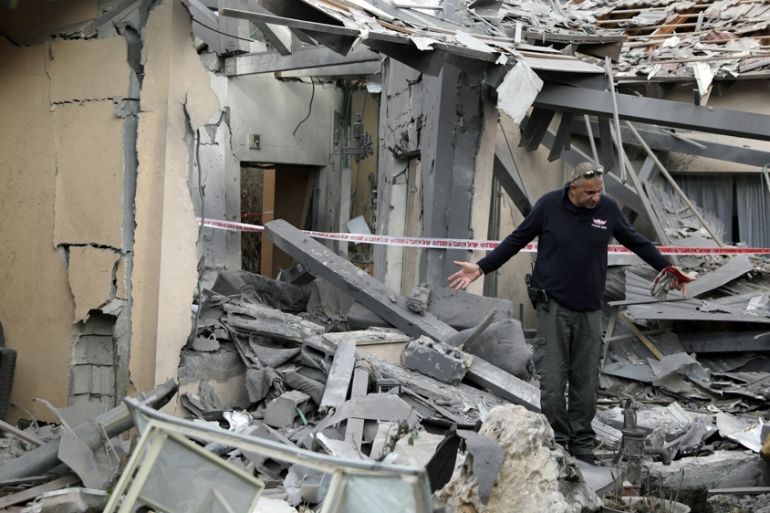Israel rocket attack: Seven wounded north of Tel Aviv
Local Israeli council near Gaza border warns residents to expect military action as country waits for response.

An early morning rocket, allegedly fired from the Gaza Strip, struck a home in central Israel on Monday, wounding seven people and prompting Prime Minister Benjamin Netanyahu to cut short a trip to Washington.
The developments set the stage for a potential major conflagration, shortly before Israel’s upcoming elections.
Keep reading
list of 4 itemsNSM-20: ‘Inconsistencies’ plague US assessment on Israel’s Gaza war conduct
Israel’s war on Gaza updates: Ground assaults intensify in north and south
South Africa asks ICJ to order Israel to withdraw from Gaza’s Rafah
The rocket attack destroyed a residential home in the community of Mishmeret, north of the city of Kfar Saba, wounding six members of the family.
Israel’s ambulance service said it treated seven people overall, including two women who were moderately wounded. The others, including two children and an infant, had minor wounds.
The sounds of air raid sirens jolted residents of the Sharon area, northeast of Tel Aviv, from their sleep shortly after 5am (03:00 GMT). A strong sound of an explosion followed.
An Israeli military spokesperson said the rocket attack was carried out by Hamas, adding that the army was set to deploy two brigades and infantry units to the southern Gaza area. It also called up reserves after the rocket attack.
There was no immediate claim of responsibility for Monday’s incident. Al Jazeera reached out to Hamas officials in the Gaza Strip but received no response.
Later on Monday, a Hamas official denied to AFP news agency that the movement was behind the attack.
“No one from the resistance movements, including Hamas, has an interest in firing rockets from the Gaza Strip towards the enemy,” the official said on condition of anonymity, evoking the possibility that the strike may have been caused by “bad weather”.
He added that the same message had been delivered to Egypt, which has acted as mediator between Israel and Hamas.
‘Forceful response’
Netanyahu, who was in Washington to meet President Donald Trump, held emergency consultations with military officials back in Israel and decided to cut his visit short, cancelling a planned address to the AIPAC conference and meetings with congressional leaders.
“There has been a criminal attack on the State of Israel and we will respond forcefully,” he said. “In a few hours I will meet with President Trump. I will return to Israel immediately afterward.”
Speaking from occupied West Jerusalem, Al Jazeera’s Stefanie Dekker said that Netanyahu is under “huge pressure” to act.
“An escalation in response could be something like seeing Israel target the homes or positions of Hamas leaders,” she said.
“Israeli media reported former security officials saying that what is needed now is a more forceful response to cut out the capability of Hamas.”
Witnesses in Gaza told AP news agency they saw Hamas officials evacuating government premises, anticipating an Israeli response to the alleged attack.
Hamas also announced that its Gaza chief, Yehiya Sinwar, had cancelled a scheduled public speech. Israel also shut down its main cargo crossing into Gaza.
Al Jazeera’s Harry Fawcett on the Gaza-Israel border said that “most people are expecting a major Israeli operation.”
He said the Sderot regional council, the local government on the Israeli side of the Gaza border told them that “there has been a warning given to Israeli residents around here to expect Israeli military action soon, and to expect the sound of explosions coming from the Gaza Strip.”
According to local Palestinian news agency Maan, the head of Palestinian Islamic Jihad movement, Ziyad al-Nakhla, said that if Israel launches an attack on the Gaza Strip, it would provoke a “strong response”.
Monday’s attack came 10 days after rockets were fired from Gaza towards Tel Aviv.
The Israeli military at the time struck back and the sides appeared to be hurtling towards another confrontation. But Gaza’s Hamas leaders said the rocket was fired accidentally and calm was quickly restored.
Dire economic situation
Gaza has been under the control of Hamas since 2007. The group won a decisive victory in parliamentary elections a year before, but western governments refused to recognise their win.
In June 2007, Hamas fought against a pre-emptive coup by its rival Fatah, which controls the Palestinian Authority, resulting in driving it out of the strip.
The same summer saw Israel and Egypt impose an ongoing land, naval and air blockade on the coastal enclave. Israel has also waged three offensives on Gaza since December 2008. The last such offensive was in 2014, in which more than 2,000 Palestinians – the majority of them civilians – were killed.
The 52-day war also severely damaged Gaza’s already weak infrastructure, leading the United Nations to state that the strip would be “uninhabitable” by 2020.
The blockade against Gaza, combined with sanctions by the rival Palestinian Authority, have exacerbated a dire economic crisis in the enclave. Recently, Hamas has come under rare public criticism for the harsh conditions in the territory.
The latest outburst comes at a sensitive time for both sides. Israel is holding national elections in 15 days.
Netanyahu, who also served as defence minister, is locked in a tight fight for re-election and has faced heavy criticism from his opponents for what they say has been an ineffective response to armed groups in Gaza.
Egypt, Qatar and the UN are trying to broker a long-term truce between Israel and Hamas but that effort has yet to bring about an agreement.
At the same time, there has been an uptick in violence in the occupied West Bank over the past week, with Israel killing two Palestinians it said attacked its troops.